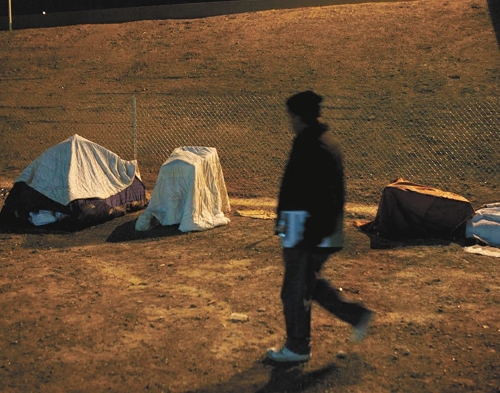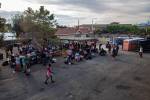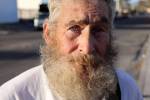Count reveals many homeless in Las Vegas
The people of downtown's homeless corridor are sleeping.
They lie side-by-side, dozens of them, one after another, just a few yards from Interstate 15 along A Street. Some are making do with a couple of thin blankets. Others are nestled in sleeping bags. Still more are huddled inside makeshift shelters pulled together from old boxes, shopping carts and a tarp or two.
It's 3 a.m. Thursday and noisy because of the trucks roaring by on the freeway. The homeless who live here are used to this and sleep right through. Most also are unaware that they have company: three homeless "guides" and a beat cop, sent to count them.
"How many do you think are in there?" one of the guides asks no one in particular, gesturing toward a tattered tent not far from the Casual Labor Office, where scores of homeless gather early each morning in hopes of scoring a day's work.
The team is at the end of its first hour of counting as part of a large-scale, point-in-time homeless census completed every two years. The street count, together with numbers gathered during a separate count in rural Clark County and from shelters, hospitals and other sources, gives social service providers a clear idea of how the local homeless population has changed. Updated numbers also are required to apply for federal grant money to fight homelessness.
The last count, completed in 2009, found 13,338 people were homeless in Clark County. Most of those who work with the homeless expect this year's count to reveal the population has grown because of the long-troubled economy and cuts to programs that help the poor. Final results are expected in April.
Hundreds of volunteers and paid guides, divided into teams each assigned a small sector of the valley, simultaneously fan out across Southern Nevada one night every other January to complete the count. Similar counts are happening across the country.
The team counting near A Street is assigned a roughly two-mile perimeter in the heart of the homeless corridor. Just an hour in and they've counted about a hundred people, including several sleeping beneath an overpass near the railroad tracks, a dozen or so camped outside a towing company, and a solitary old woman sitting on the sidewalk, talking to herself, next to the Salvation Army shelter.
"She's been out here eight years," says Jeff Williams, one of the homeless guides. "She's in a bad way. There are lots of people out here like that."
Williams, 47, has been living in a shelter at Catholic Charities of Southern Nevada since he got sober three months ago. He's one of hundreds of guides hired for $10 an hour to help with the count.
"They are the local experts," says Michele Fuller-Hallauer, a coordinator with the Southern Nevada Regional Planning Coalition's Committee on Homelessness, which sponsors the count.
Williams, who lost his last job about a year ago, has only been homeless a short time. But, he says, "I've been running these streets since I was 21 years old."
He knows just where to lead the other counters, even in the dark, through a man-size hole cut in a chain-link fence that circles what was once a trailer park at Main Street and Washington Avenue. Now the lot is a spacious camp site for homeless people. Each has claimed his or her own rectangular strip of pavement where trailers used to park.
"It used to be a lot worse," says Las Vegas police officer David Cienega, who has worked the area for more than a decade. "We've helped everyone we could, who wanted it."
Police in the area have been criticized in the past for harassing the homeless, rousting them in the early morning hours, sometimes arresting them on minor charges such as trespassing or sleeping on a bus bench.
"It's not like that anymore," Cienega says. Police are more focused on helping the homeless now, he says. "Instead of 'hook and book,' we help them find shelter, food, whatever they need," he says.
But officials also must respond to complaints from downtown business owners who don't appreciate the trash and other problems that stem from hosting dozens of uninvited campers each night.
Cienega points his flashlight behind an old water tank at the trailer park. The homeless who stay here have turned the space into an outdoor toilet.
"You can see why they don't want them camping here," he says.
Count organizers instruct the teams to avoid approaching the homeless for safety and practical reasons.
"We need to cover every centimeter of our areas" to get an accurate count, says Tyrone Thompson, a neighborhood planning and initiatives manager for the city of Las Vegas. "Please be cognizant of people sleeping. We are truly just counting people."
Russ Fordham, another guide, says it's hard to predict whether the count will increase this year. Some are leaving town in search of work. Social service providers have assisted the exodus by offering one-way bus tickets to those who prove they have family who will take them in .
"People are getting restless and fed up with the situation," Fordham, 44, says.
Fordham spends his nights in a dirt lot just outside his assigned counting area. He's been homeless off and on for years, but steadily since April, when he lost his job in a souvenir shop. He intends to get himself out of the situation somehow and won't seek help from a shelter.
Shelters tend to have strict rules about drug and alcohol use. He smokes marijuana. This is to help his glaucoma and other health problems, he says. It also complicates his efforts to get a job, as many employers now require drug testing.
By 4 a.m., the team has finished counting in its assigned area and heads back to its starting point at Catholic Charities. In just two hours, team members counted nearly 200 homeless people.
Contact reporter Lynnette Curtis at lcurtis@reviewjournal.com or 702-383-0285.






























